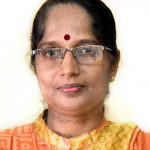 Dr. Nikita Gopal is Principal Scientist with the Indian Council of Agricultural Research – Central Institute of Fisheries Technology (ICAR-CIFT), Kochi, Kerala, India. She holds a PhD in Agricultural Economics and has been working in the field of fisheries for the past 23 years. Her areas of work has been trade and markets in the fisheries sector; evaluation of fisheries technologies; and socio-economic studies among fishing communities. For the past several years she has also been actively engaged in gender research in fisheries and aquaculture and has worked on women in seafood processing sector; in small scale aquaculture and fisheries; and in marketing and other post-harvest activities. In association with NACA she has worked on an international project on gender in aquaculture in Thailand, Cambodia, Vietnam and Lao PDR. She is an elected Fellow of the Society of Fisheries Technologists of India (FSFT). She has coordinated a project looking at gender and seaweed farming that was operational in India and Kenya. Her current research interest is on labour issues in the fishing and fish processing sectors.
Dr. Nikita Gopal is Principal Scientist with the Indian Council of Agricultural Research – Central Institute of Fisheries Technology (ICAR-CIFT), Kochi, Kerala, India. She holds a PhD in Agricultural Economics and has been working in the field of fisheries for the past 23 years. Her areas of work has been trade and markets in the fisheries sector; evaluation of fisheries technologies; and socio-economic studies among fishing communities. For the past several years she has also been actively engaged in gender research in fisheries and aquaculture and has worked on women in seafood processing sector; in small scale aquaculture and fisheries; and in marketing and other post-harvest activities. In association with NACA she has worked on an international project on gender in aquaculture in Thailand, Cambodia, Vietnam and Lao PDR. She is an elected Fellow of the Society of Fisheries Technologists of India (FSFT). She has coordinated a project looking at gender and seaweed farming that was operational in India and Kenya. Her current research interest is on labour issues in the fishing and fish processing sectors.
She is a senior leader of the Gender in Aquaculture and Fisheries (GAF) Section of the Asian Fisheries Society (AFS) and its current Vice Chair. She has received the AFS Gold Medal (2019), AFS Merit Award in 2013 and the AFS Certificates of Appreciation in 2016 for her contribution to gender research and for her organisational role in the GAF events at the triennial Asian Fisheries and Aquaculture Forum of the AFS.
 Dr. Madhu V R is a principal scientist at ICAR-CIFT working on aspects related to responsible fishing operations along the Indian coast. He works on designing responsible fishing gears and bycatch reduction devices for trawlnets. He is also interested in the use of satellite data to make decisions for sustainable fishing along the Indian coast and has been involved in projects with Dept. of Space and Ministry of Earth Sciences, Govt. of India for developing potential fishing zones, which provides advisories for fishers regarding availability of fish catches. Studying the ecological indicators that can be derived using satellite data and using them for marine fisheries planning is another area of interest and he is associating with agencies in India for developing indicators that can help in such interventions. His other research interest includes studying fish behaviour in relation to fishing gear, to design and develop fishing gears for conservation.
Dr. Madhu V R is a principal scientist at ICAR-CIFT working on aspects related to responsible fishing operations along the Indian coast. He works on designing responsible fishing gears and bycatch reduction devices for trawlnets. He is also interested in the use of satellite data to make decisions for sustainable fishing along the Indian coast and has been involved in projects with Dept. of Space and Ministry of Earth Sciences, Govt. of India for developing potential fishing zones, which provides advisories for fishers regarding availability of fish catches. Studying the ecological indicators that can be derived using satellite data and using them for marine fisheries planning is another area of interest and he is associating with agencies in India for developing indicators that can help in such interventions. His other research interest includes studying fish behaviour in relation to fishing gear, to design and develop fishing gears for conservation.
 Dr Sandhya K M is working as Scientist in Fishing Technology Division of ICAR-CIFT. Her area of research includes technological interventions for fishing gear improvements, developing standards for fishing gear materials, assessment of ghost fishing, their impacts and mitigation measures . She has done her PhD from Central Institute of Fisheries Education, Mumbai, India focusing on the Stock status of Otolithes cuvieri along Ratnagiri coast, Maharashtra, India .Currently she has been involved in projects aiming at improvement of properties of fishing gear materials, developing guidelines for sustainable small scale fishing based on fishing operations and their energy use, investigations on ghost fishing by derelict traps and gillnets in selected areas of India for developing mitigation measures. She has also served as Scientist in Central Inland Fisheries Research Institute Barrackpore, India and was associated with fisheries development & conservation of resources in wetlands and reservoirs and also worked in multi institutional project for assessing the stock status of migratory fish Tenualosa ilisha along Hooghly Bhagirathi system in India for developing management guidelines.
Dr Sandhya K M is working as Scientist in Fishing Technology Division of ICAR-CIFT. Her area of research includes technological interventions for fishing gear improvements, developing standards for fishing gear materials, assessment of ghost fishing, their impacts and mitigation measures . She has done her PhD from Central Institute of Fisheries Education, Mumbai, India focusing on the Stock status of Otolithes cuvieri along Ratnagiri coast, Maharashtra, India .Currently she has been involved in projects aiming at improvement of properties of fishing gear materials, developing guidelines for sustainable small scale fishing based on fishing operations and their energy use, investigations on ghost fishing by derelict traps and gillnets in selected areas of India for developing mitigation measures. She has also served as Scientist in Central Inland Fisheries Research Institute Barrackpore, India and was associated with fisheries development & conservation of resources in wetlands and reservoirs and also worked in multi institutional project for assessing the stock status of migratory fish Tenualosa ilisha along Hooghly Bhagirathi system in India for developing management guidelines.
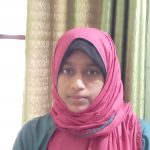 Dr. Rejula K is a scientist at ICAR-CIFT and working on aspects related to socio-economic development of fishers and other people involved in fishery related activities. With specialisation in Agricultural Extension, she works on developing methodologies to measure social psychological traits like attitude of fishers. She has experience in associating with projects on impact assessment of fishery science and technology on socio-economic fabric of fishers. She also has experience in working in the area of fish-preneurship development, assessing input and service delivery system for marine fisheries development in Kerala and consumer behaviour analysis studies. She is also associating with agencies in India for dissemination of harvest and post-harvest technologies developed by ICAR-CIFT among fishery stakeholders. She is interested in analysing impact of disasters on vulnerable communities like fishers.
Dr. Rejula K is a scientist at ICAR-CIFT and working on aspects related to socio-economic development of fishers and other people involved in fishery related activities. With specialisation in Agricultural Extension, she works on developing methodologies to measure social psychological traits like attitude of fishers. She has experience in associating with projects on impact assessment of fishery science and technology on socio-economic fabric of fishers. She also has experience in working in the area of fish-preneurship development, assessing input and service delivery system for marine fisheries development in Kerala and consumer behaviour analysis studies. She is also associating with agencies in India for dissemination of harvest and post-harvest technologies developed by ICAR-CIFT among fishery stakeholders. She is interested in analysing impact of disasters on vulnerable communities like fishers.
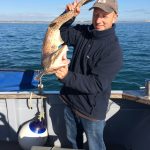 Paul Kemp is a Professor of Fisheries Management at the International Centre for Ecohydraulics Research, University of Southampton (UK). Paul’s research interests relate to enhancing sustainable resource exploitation and management, particularly focusing on fisheries. Historically, his research has centred on advancing more environmentally friendly water, energy and food systems, specifically the application of behavioural ecology to understanding and solving challenges in water and energy engineering, e.g. fish pass and screening design, assigning compensation flow regimes, and improving habitat restoration strategies. More recently his research interests have been directed towards understanding the impacts of systemic shocks, such as the COVID-19 pandemic and Brexit, on marine fisheries.
Paul Kemp is a Professor of Fisheries Management at the International Centre for Ecohydraulics Research, University of Southampton (UK). Paul’s research interests relate to enhancing sustainable resource exploitation and management, particularly focusing on fisheries. Historically, his research has centred on advancing more environmentally friendly water, energy and food systems, specifically the application of behavioural ecology to understanding and solving challenges in water and energy engineering, e.g. fish pass and screening design, assigning compensation flow regimes, and improving habitat restoration strategies. More recently his research interests have been directed towards understanding the impacts of systemic shocks, such as the COVID-19 pandemic and Brexit, on marine fisheries.
 Dr Silke Roth is Professor of Sociology in the Department of Sociology, Social Policy and Criminology at the University of Southampton. She is the author of Paradoxes of Aid Work and is particularly interested in questions of solidarity, inclusion and exclusion. This includes a critical assessment of the impact of information and communication technologies (ICT) on aid relationships (ICT for development/ICT4D, digital humanitarianism). Her article ‘Deconstructing the Data Life-Cycle in Digital Humanitarianism’ challenges an optimistic view on digital humanitarianism and ICT for development and highlights how Big Data and ICT reproduce Global inequalities. She has also written about Linguistic capital and inequality in aid relations.
Dr Silke Roth is Professor of Sociology in the Department of Sociology, Social Policy and Criminology at the University of Southampton. She is the author of Paradoxes of Aid Work and is particularly interested in questions of solidarity, inclusion and exclusion. This includes a critical assessment of the impact of information and communication technologies (ICT) on aid relationships (ICT for development/ICT4D, digital humanitarianism). Her article ‘Deconstructing the Data Life-Cycle in Digital Humanitarianism’ challenges an optimistic view on digital humanitarianism and ICT for development and highlights how Big Data and ICT reproduce Global inequalities. She has also written about Linguistic capital and inequality in aid relations.
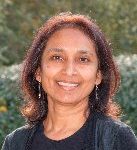 Dr Bindi Shah is a Sociologist, and has expertise in qualitative methods, migration, religion and Asian diaspora in UK and USA. Her specific areas of research include migrant integration and the role of social capital in this process among the first and second-generations; how race, class, gender and religion shape identity, belonging and citizenship in receiving societies; and South Asian masculinities and femininities. Through an ESRC funded project Dr Shah has investigated transnational circulation in the preservation and transformation of intangible and tangible religious heritage amongst diasporic Jains in the UK and USA at both organisational and individual levels. Recently, Dr Shah has examined diasporic Jain philanthropic support for a Jain faith-based NGO in Gujarat, India. She has published numerous journal articles on these topics and is an award-winning book author. Currently, Dr Shah leads the Ramniklal Solanki Pioneers Project for the University of Southampton’s India Centre for Inclusive Growth and Sustainable Development. This high impact project will document the life histories of British South Asians who have made a significant contribution to the making of modern Britain, create a digital archive, and form a living bridge between the UK and the Indian sub-continent.
Dr Bindi Shah is a Sociologist, and has expertise in qualitative methods, migration, religion and Asian diaspora in UK and USA. Her specific areas of research include migrant integration and the role of social capital in this process among the first and second-generations; how race, class, gender and religion shape identity, belonging and citizenship in receiving societies; and South Asian masculinities and femininities. Through an ESRC funded project Dr Shah has investigated transnational circulation in the preservation and transformation of intangible and tangible religious heritage amongst diasporic Jains in the UK and USA at both organisational and individual levels. Recently, Dr Shah has examined diasporic Jain philanthropic support for a Jain faith-based NGO in Gujarat, India. She has published numerous journal articles on these topics and is an award-winning book author. Currently, Dr Shah leads the Ramniklal Solanki Pioneers Project for the University of Southampton’s India Centre for Inclusive Growth and Sustainable Development. This high impact project will document the life histories of British South Asians who have made a significant contribution to the making of modern Britain, create a digital archive, and form a living bridge between the UK and the Indian sub-continent.
 Gowshika Subbiah is currently working on the impact of COVID-19 on the marine fisheries of the British Isles in collaboration with the International Centre for Ecohydraulics Research at the University of Southampton. Interested in interdisciplinary research, she is a recently graduated Environmental Scientist with a master’s degree in Environmental Pollution Control from the University of Southampton and bachelor’s degree in Physics from Manonmaniam Sundaranar University, India. Her research interests include fisheries science and resource management.
Gowshika Subbiah is currently working on the impact of COVID-19 on the marine fisheries of the British Isles in collaboration with the International Centre for Ecohydraulics Research at the University of Southampton. Interested in interdisciplinary research, she is a recently graduated Environmental Scientist with a master’s degree in Environmental Pollution Control from the University of Southampton and bachelor’s degree in Physics from Manonmaniam Sundaranar University, India. Her research interests include fisheries science and resource management.
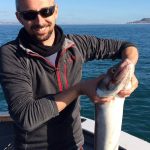 Dr Andrew Vowles is a Research Fellow in Ecohydraulics and Fisheries Management at the International Centre for Ecohydraulics Research, University of Southampton. His research interests relate to mitigating anthropogenic impacts on aquatic systems. Initially this was achieved while working for a river restoration consultancy and, more recently through PhD and Post-Doctoral research positions. Andrew’s research is truly interdisciplinary, linking biology and ecology with principles of hydraulic engineering with the primary aim of advancing the sustainable management and conservation of aquatic systems. Andrew mainly works with fish and adopts a range of techniques, from experimental lab-based studies that allow the fine-scale behaviour of fish to be quantified to field-based research on fish habitat use and community composition. Research outputs tend to involve the quantification of environmental impact and testing and development of mitigation technologies.
Dr Andrew Vowles is a Research Fellow in Ecohydraulics and Fisheries Management at the International Centre for Ecohydraulics Research, University of Southampton. His research interests relate to mitigating anthropogenic impacts on aquatic systems. Initially this was achieved while working for a river restoration consultancy and, more recently through PhD and Post-Doctoral research positions. Andrew’s research is truly interdisciplinary, linking biology and ecology with principles of hydraulic engineering with the primary aim of advancing the sustainable management and conservation of aquatic systems. Andrew mainly works with fish and adopts a range of techniques, from experimental lab-based studies that allow the fine-scale behaviour of fish to be quantified to field-based research on fish habitat use and community composition. Research outputs tend to involve the quantification of environmental impact and testing and development of mitigation technologies.
 Dr. Kristina Boerder is a postdoctoral researcher at Dalhousie University working on the impacts of global fisheries and climate change on marine conservation measures such as marine protected areas. She completed her Ph.D. at Dalhousie University in collaboration with Global Fishing Watch in 2018, focussing on the use of satellite-based fishing vessel tracking data for marine conservation, the role of trans-shipment of catch in seafood supply chains as well as conservation of biodiversity in areas beyond national jurisdiction. Kristina also holds a master’s degree in marine biology from the University Bremen, Germany, and has worked in several marine protected areas across the globe, developing a strong background on fisheries and marine spatial management as well as marine policy issues. Currently she is working as lead scientist with academia, industry, and NGOs on the use of big data in the context of marine spatial management and conservation.
Dr. Kristina Boerder is a postdoctoral researcher at Dalhousie University working on the impacts of global fisheries and climate change on marine conservation measures such as marine protected areas. She completed her Ph.D. at Dalhousie University in collaboration with Global Fishing Watch in 2018, focussing on the use of satellite-based fishing vessel tracking data for marine conservation, the role of trans-shipment of catch in seafood supply chains as well as conservation of biodiversity in areas beyond national jurisdiction. Kristina also holds a master’s degree in marine biology from the University Bremen, Germany, and has worked in several marine protected areas across the globe, developing a strong background on fisheries and marine spatial management as well as marine policy issues. Currently she is working as lead scientist with academia, industry, and NGOs on the use of big data in the context of marine spatial management and conservation.
 Rachel Hanbury (Director of Marine and Fisheries Compliance, OceanMind) started with fisheries enforcement in the UK while studying towards her degree in Coastal Marine Biology. Her enforcement career quickly went global when she took up a post working on the UK Government IUUF enforcement team engaging in a number of global cases, including the Thunder case. More recently, as the Head of Fisheries Control, Enforcement and IUU Policy for UK Government, Rachel’s responsibilities included working up all relevant EU exit planning and legislation for the UK. Having seen the global impact of IUU fishing and the difficulties Government’s face enforcing against it, Rachel has now taken over as Director of Marine and Fisheries Compliance at OceanMind, where she proudly leads an incredible team responsible for providing analysis, support and expertise to Governments across the globe to achieve maximum impact. She also delivers Monitoring, Control and Surveillance (MCS) and in- country capacity building advice where projects require further support. Throughout her career she has also worked on trade in illegal fish, supply chain and border controls through the lenses of enforcement, policy and project support.
Rachel Hanbury (Director of Marine and Fisheries Compliance, OceanMind) started with fisheries enforcement in the UK while studying towards her degree in Coastal Marine Biology. Her enforcement career quickly went global when she took up a post working on the UK Government IUUF enforcement team engaging in a number of global cases, including the Thunder case. More recently, as the Head of Fisheries Control, Enforcement and IUU Policy for UK Government, Rachel’s responsibilities included working up all relevant EU exit planning and legislation for the UK. Having seen the global impact of IUU fishing and the difficulties Government’s face enforcing against it, Rachel has now taken over as Director of Marine and Fisheries Compliance at OceanMind, where she proudly leads an incredible team responsible for providing analysis, support and expertise to Governments across the globe to achieve maximum impact. She also delivers Monitoring, Control and Surveillance (MCS) and in- country capacity building advice where projects require further support. Throughout her career she has also worked on trade in illegal fish, supply chain and border controls through the lenses of enforcement, policy and project support.
 Dr Deepayan Bhowmik is a lecturer in Computing Science at the University of Stirling. His research interests include fundamental signal and image processing and its applications especially in remote environmental monitoring using multimodal sensing (through satellite imagery and local sensors) and their processing through AI-enabled data analytics. He is interested in developing engineering solutions for interdisciplinary applications such as providing technology to aid marine fisheries or monitoring aquatic weeds in preserving a sustainable ecosystem.
Dr Deepayan Bhowmik is a lecturer in Computing Science at the University of Stirling. His research interests include fundamental signal and image processing and its applications especially in remote environmental monitoring using multimodal sensing (through satellite imagery and local sensors) and their processing through AI-enabled data analytics. He is interested in developing engineering solutions for interdisciplinary applications such as providing technology to aid marine fisheries or monitoring aquatic weeds in preserving a sustainable ecosystem.
 Richard MacCowan is an award-winning multi-disciplinary designer and works worldwide on urbanism, manufacturing, and agricultural projects. He has a background in international real estate investment and development and sustainable design, combining this with behavioural science and nature-inspired design. The current initiatives of Biomimicry Innovation Lab involve the development and delivery of investment into UK-based scientific research and development, with a focus on nature-inspired innovation and the circular economy. Working in tandem with the Nadathur Group to deliver this initiative, the aim put the UK at the forefront of nature-inspired innovation. Internally, they have developed a model to understand the value of ecosystem services in a variety of environments.
Richard MacCowan is an award-winning multi-disciplinary designer and works worldwide on urbanism, manufacturing, and agricultural projects. He has a background in international real estate investment and development and sustainable design, combining this with behavioural science and nature-inspired design. The current initiatives of Biomimicry Innovation Lab involve the development and delivery of investment into UK-based scientific research and development, with a focus on nature-inspired innovation and the circular economy. Working in tandem with the Nadathur Group to deliver this initiative, the aim put the UK at the forefront of nature-inspired innovation. Internally, they have developed a model to understand the value of ecosystem services in a variety of environments.
 Bethan O’Leary is a Research Fellow at the University of Exeter and an Honorary Research Fellow at the University of York. Her research interests lie in the sustainable management of marine resources and the integration of scientific research with applied environmental management and policy. Currently this is focused on marine protected areas, fisheries management, marine spatial planning, nature-based solutions in marine and coastal environments, and evidence review methodology.
Bethan O’Leary is a Research Fellow at the University of Exeter and an Honorary Research Fellow at the University of York. Her research interests lie in the sustainable management of marine resources and the integration of scientific research with applied environmental management and policy. Currently this is focused on marine protected areas, fisheries management, marine spatial planning, nature-based solutions in marine and coastal environments, and evidence review methodology.
